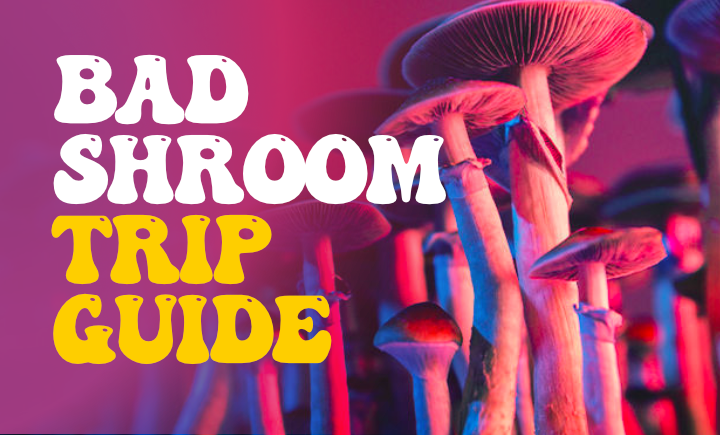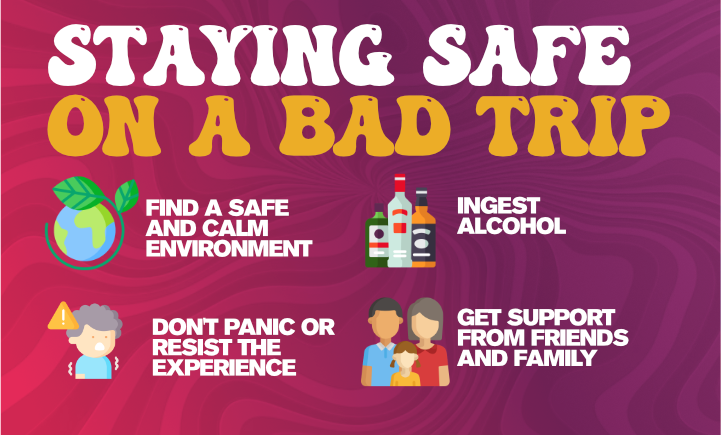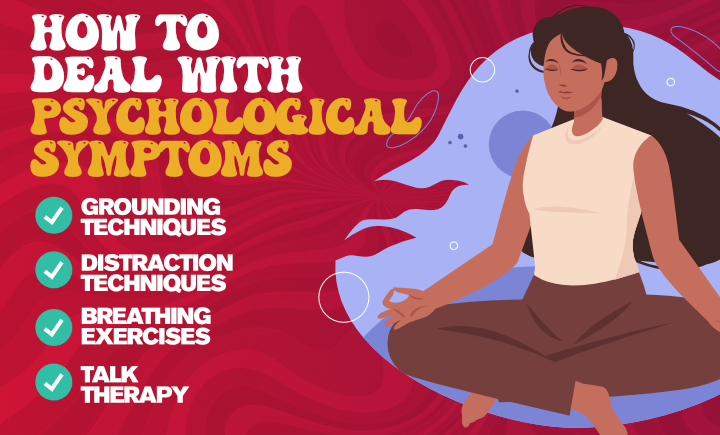Bad Shroom Trip Guide
- Magic Mushrooms
-
Feb 27
- Share post

So You Had a Bad Shroom Trip – Now What?
Taking mushrooms can be thrilling, especially if it’s your first time and you have no idea what to expect.
Most psychedelic trips are magical, but have you ever heard of a bad trip? Or even had it happen to you?
While most people find these trips delightful and life-changing, it’s good to learn that they can also take an unexpected turn.
The effects of consuming psychedelic mushrooms, also known as “shrooms,” don’t always go as planned, and that’s okay. It can be frightening and troubling. In those moments, you wonder how you can support yourself.
This guide will cover everything you need to know about psilocybin mushrooms, including symptoms and how to stop a negative experience if you ever have one.
Understanding the Symptoms of a Bad Shroom Trip
If you’re considering taking a psychedelic, you should know about some challenging experiences.
While most bad shroom trips are not life-threatening, that is not something to rule out. Everyone reacts differently to mushrooms, and your surroundings, how much you take, and who you are with play a significant role.
Understand that on shrooms, sometimes the slightest thing can derail your trip. It is essential to consider your mental health prior to taking any hallucinogens like LSD or psilocybin mushrooms.
It is also important to remember that when taking any drug, you must surround yourself with positive energy and good people. It’s worth noting that having a designated shroom trip sitter is ideal, especially if this is your first time taking shrooms. A trip sitter is a babysitter who ensures your trip runs smoothly. With the proper guidance, your trip sitter can quickly turn your “bad” trip into a good trip.
Here is an overview of the two major categories of symptoms that may occur during a bad trip.
Physical Symptoms
Physical reactions are common when using any psychedelic, as the body reacts to the active ingredients in the drug. Physical reactions to magic mushrooms may include:
Nausea
Vomiting
Dizziness
Confusion
Muscle tension or twitching
Dilated pupils
Accelerated heart rate
More severe symptoms, such as seizures or cardiac events, are also possible during a negative psychedelic drug experience. However, these are uncommon and are usually only experienced by those who have taken much higher than recommended doses.
Psychological Symptoms
The most common symptom of a bad shroom trip is intense anxiety or paranoia. This anxiety or paranoia can manifest through irrational thinking and fear of harm being inflicted upon themselves or others around them.
People experiencing this state may become paranoid about ordinary occurrences like noises or shadows in their environment, leading to feelings of terror or dread. Other psychological symptoms associated with bad trips include:
Depersonalization (feeling like you “don’t belong” while in the moment)
Hyper-emotional responses
Potential psychosis (hallucinations/ distortions)
Disorientation
Although unpleasant trips can occur with any amount of psychedelics consumed over time, they are especially dangerous when consumed in large quantities at once. When using these substances responsibly, it is critical to always use moderation.
Assume that despite your precautions, your experience is becoming overwhelming. In that case, it’s best to reach out to friends, family members, or health professionals as soon as possible so that they can assist you safely and effectively.
Staying Safe During a Bad Shroom Trip
Taking psychedelics is a powerful experience that can open up new ways of thinking and feeling, but staying safe and grounded is critical if things don’t go as planned. Here are some suggestions for what to do if you or someone you know is experiencing a bad shroom trip.
Find a Safe and Calm Environment
First and foremost, ensure that you are in a secure location. The physical environment in which you are can significantly impact your overall psychedelic experience. Safety comes first, so avoid large crowds or loud noises when using these substances. Seek a quiet, comfortable place where you can be surrounded by people who care about your safety and well-being if you have an overwhelming shroom trip. If you need assistance, don’t be afraid to ask for it.
Don’t Panic or Resist the Experience
It may appear difficult at first, but remember that this will pass. Fighting against the sensations and emotions that arise during a difficult journey will only increase anxiety and discomfort. Instead, use mindfulness techniques such as focusing on your breath or counting slowly to stay present with whatever arises without becoming lost in thought or judgment. This relieves stress and encourages acceptance of what is happening as it is, allowing the intensity of the challenging experience to fade over time.
Alcohol
You read that right! When it comes to a crazy scary shroom trip, alcohol is your best friend in an emergency. Taking a shot or two of any alcohol should reduce or even eliminate the full range of side effects caused by the mushrooms. The stronger the alcohol, the better your chances of escaping that negative mental state.
Get Support from Trusted Friends or Family Members
Having someone who understands your situation can make all the difference. A trip sitter is necessary when taking hallucinogenic drugs, including dmt, ayahuasca, MDMA, LSD, and shrooms. Having friends or family members with whom you feel comfortable sharing your thoughts and feelings will allow them to offer support during an unpleasant shroom trip experience.
Finding positive distractions such as talking, listening to music, meditating, or engaging in creative activities can also help take your mind off any troubling thoughts or feelings which may arise during this process.
Staying safe should always be your top priority, regardless of the type of psychedelic experience you choose. It is critical to listen to your body, be mindful of dosage levels, and surround yourself with supportive people to avoid adverse reactions to mushrooms.
Dealing with Psychological Symptoms
Psychedelic drug use can have positive and negative consequences, including physical and psychological effects. Several techniques may help alleviate the intensity of a shroom trip if you struggle with psychological symptoms. Here are three primary approaches to dealing with challenging psychedelic experiences.
Grounding Techniques
Grounding exercises help to reconnect with reality and the present moment by focusing on specific elements of your physical environment, such as colors, textures, or sounds. This can be accomplished through sensory activities like looking at art or listening to soothing music. Any activity that requires focus and allows you to stay in tune with your immediate surroundings will help take the edge off an overwhelming trip experience.
Distraction Techniques
Distraction techniques involve engaging in creative activities or talking to someone to take your mind off troubling thoughts or feelings that may arise during this process. Anything from reading a book or playing a game to chatting about current events or reflecting on past experiences can help shift your focus away from any anxiety-inducing thoughts that psychedelics may have brought.
This is particularly helpful when seeking out supportive friends and family members who understand your situation and can offer consolation during an uncomfortable shroom trip experience.
Psychotherapy, or talk therapy, is often constructive in drug-related issues. Talking to a psychiatrist, psychologist, or other mental health providers could aid your negative shroom trip if available.
Breathing Exercises
While breathing exercises may appear simple, they are highly effective tools for dealing with the heightened emotions associated with psychedelics. Focusing on slowly inhaling and exhaling helps to trigger the body’s natural relaxation response, which reduces stress while providing mental clarity as you work through difficult moments on your journey.
Taking conscious breaths also reminds you that you are safe in the present moment. Rather than fighting whatever arises, simply observing what is happening can make all the difference in quickly calming down during a bad shroom trip episode.
Seeking Medical Help
If you experience troubling symptoms such as intense anxiety, difficulty breathing, rapid heart rate, or confusion after taking psychedelics, it may be time to seek medical attention. If your reaction has lasted more than 24 hours or you are concerned about your safety, do not hesitate to contact emergency services.
In the event of psychedelic-related adverse reactions, seeking professional help is critical to staying safe and maintaining well-being during a difficult trip. Though psychedelic drugs are known for opening up new ways of thinking and feeling, their intensity can also strain the body’s coping mechanisms if not used responsibly and with proper precautionary measures.
When consulting with medical professionals, remember that they will ask questions about the dose taken (if known) and other substances used in combination with psychedelics on the day of the episode, so refrain from downplaying any related facts to your ingestion when getting help.
Furthermore, staying honest throughout the process will help them understand what may have occurred and how best they can assist you moving forward. Remember that doctors operate under strict ethical codes, and all information shared is kept confidential by law.
Prevention and Aftercare
The physical and psychological effects of psychedelic drugs can be positive and negative. While preparing for a shroom trip, you can take specific precautions to avoid a “bad trip” and receive aftercare advice if one occurs.
To reduce the likelihood of having an unpleasant experience while using psychedelics, consider the following factors before your trips: setting, dose, context, and mindset.
If, despite your best efforts, things don’t go as planned during shroom ingestion, don’t beat yourself up about it. Keep in mind that even experienced psychonauts have had bad trips.
The most important thing is to stay safe by surrounding yourself with supportive people who understand what happened and will not judge you (ideally sober ones). Speaking aloud about what happened can help put things into perspective and create space for self-compassion.
Takeaway
Psychedelic drugs can be a creative and powerful tool for personal growth when taken responsibly and with proper preventive measures. While they may seem intimidating initially, shroom trips often help you understand yourself more and become one with yourself.
With any drug understanding the risks involved and how to prevent or manage them is key to having a safe and enjoyable experience.
When faced with unpleasant situations on a shroom trip, remember to stay in the present moment and focus on your breath. If you need to end your trip, drink responsibly, and if things persist for more than 24 hours or you are concerned about your safety, don’t hesitate to seek medical attention.
Where’s Shrooms wants you to have a safe and enjoyable experience.
When embarking on your psychedelic journey, keep this article’s advice and enjoy the ride!


